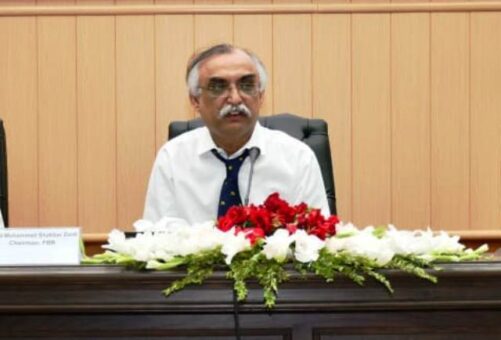ISLAMABAD: Federal Board of Revenue (FBR) on Monday said it will make easy procedure for government employees to file their annual income tax returns.
Briefing the Standing Committee of the Senate on Finance, Revenue and Economic Affairs, the FBR officials said that they were working on the project of making procedure easy for government employees to make them filers and would complete in a week.
Meeting of the Standing Committee on Finance, Revenue, and Economic Affairs was held today on August 26, under the chairmanship of Senator Farooq H. Naeeq at parliament house.
The chairman committee recommended that FBR officials get this work done in next week and give presentation before the committee.
Member custom operation DR. Jawad told the committee about decision of closure of container liner service that FBR hasn’t yet decided to close this service.
Fiber optic work is also in process, it has become operational, and it has some issues which are under consideration.
Senator Musadiq Malik said that this issue is not from FBR rather it’s from Commercial enterprises.
So committee recommended calling secretary maritime affairs in the next meeting to loop up it on with detail.
In the meeting, Maternity and Paternity leave bill 2018 by Senator Qurat ul Ann Marri, province wise details of Ministry of finance and its sub ordinate departments working under it by Senator Mir Kabir Ahmed, public petition by Muhammad Irfan regarding making a simple and understandable procedure for a government employee to become a filer and matter regarding decision for closure of regular container liner KGS service and Gawadar port were discussed.
Senator Qurat ul Ann Marri briefed the committee about her bill, but Senator Musadiq was of the view that there are some contradictions in the bill and things need to be made clear.
In Bill, it is requested that at the first three children birth; parents will get paid leave but not at the birth of 4th one, Nevertheless, it is discriminatory behavior with the 4th one.
Furthermore, Senator Anwar ul haq Kakar said that with increasing span of leave one will not get the salary which is out of question.
On the birth of child, one needs money too. Special secretary finance told them that on paternity leave, one gets 48 leaves with pay annually, one can avail from them. Chairman committee recommended that Ministry of law and Ministry of finance should prepare another drat of this bill within 15 days in the supervision of and collaboration with Senator Qurat ul Ann Marri and Senator Dr Musadiq Malik.
Regarding province wise details of Ministry of finance and its sub ordinate departments working under it Senator Mir Kabir Ahmed said according to the documents provided appointments according to provincial quota are different in the Ministry of Finance and its sub ordinate departments.
No officer is ever recruited on bigger posts from Baluchistan and in different departments posts are vacant. Chairman committee recommended it’d be better to call Advisor to Ministry of Finance and Secretary Establishment division in the next meeting to look up this matter in detail.
Senator Musadiq Malik recommended providing other provinces details quota wise as well in next meeting.
The meeting was chaired by Farooq H. Naeeq and was attended by Senator Mushahid Ullah khan, Musadiq malik, Mohsin Aziz, Anwar ul Haq Kakar, Qurat ul Ann Marri and Mir Kabir Ahmed, special secretary Finance Division Umar Hamid khan, Member custom operation FBR Dr. Jawad Agha, Chairman ECP Amir khan, Executive vice president NBP and others senior officials.




